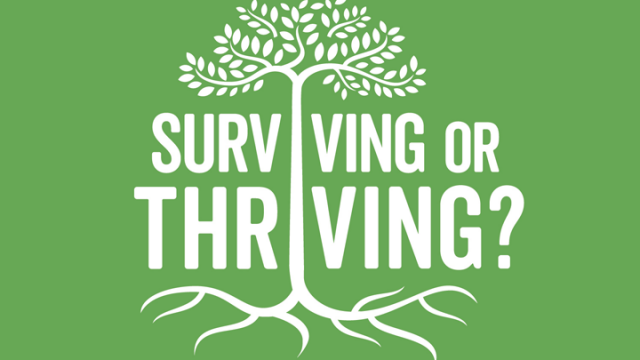In May 2017 The Mental Health Foundation released their recent research findings entitled: “Surviving or Thriving: The State of the UK’s Mental Health”. This is a very important document that gathers significant data from 2,290 interviews, 82% online and 18% by phone.
In particular, the research reveals:
a higher proportion of mental illness among those with lower income
“Nearly 3 in 4 people living in the lowest household income bracket (less than £1,200 per month) report having experienced a mental health problem; compared to 6 in 10 of the highest household income bracket (over £3,701 pm).”
especially those without employment
“The great majority (85%) of people out of work have experienced a mental health problem compared to two thirds of people in work and just over half of people who have retired.”
The definition of thriving was given as:
“The capacity of each of us to feel, think, and act in ways that enhance our ability to enjoy life and deal with the challenges we face. It is a positive sense of emotional and spiritual well-being that respects the importance of culture, equity, social justice, interconnections and personal dignity.”
However only 13% of people report living with high levels of good mental health.
The conclusions of the paper are
- Current levels of good mental health are disturbingly low. The barometer of success of any nation is the health and wellbeing of its people. We have a long way to go before we can say that we are a thriving nation. Although we have made great strides in the health of our bodies and our life expectancy, we now need to achieve the same for the good health of our minds.
- The survey suggests that our collective mental health is deteriorating. Overall most of us report experiencing a mental health problem in our lifetime. However, young adults report this at a higher level, despite having had fewer years in their lives to experience this. While there may be an element which reflects a greater ease at acknowledging a mental health problem, nevertheless this suggests a real and emerging problem. It is possible that it is linked to greater insecurities in life expectations for work, relationships and homes. The reasons and solutions warrant investigation.
- The figures show that the experience of poor mental health, while touching every age and demographic, is not evenly distributed. If you are female, a young adult, have low income, living alone or in a large household, your risks of facing mental ill health are higher.
The research is presented in a clear and attractive way, and includes “ten steps we can all take to thrive” as well as a moving personal story. The whole thing probably takes around 40 minutes to read. If you want to keep up with cutting edge research on mental health in the UK, this is a great place to start. Go to: www.mentalhealth.org.uk



